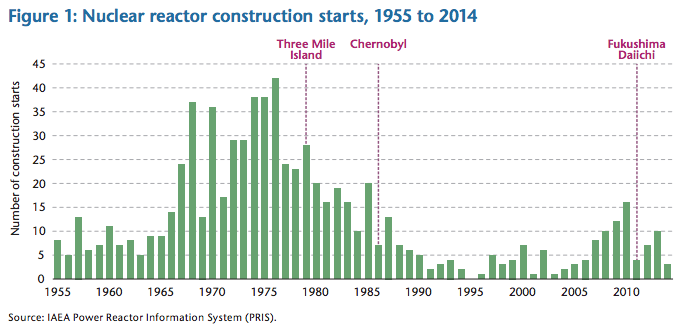How can nuclear energy benefit us?
1 Answer
Its key benefit is it can combat climate change and it could provide energy for centuries to come.
Explanation:
Nuclear energy is in decline worldwide due to the fears the public has over potential accidents that spread radiation. Very few reactors are being built any more and many are being shut down as they reach their end of life.
The image below shows the trends in nuclear reactor construction, and we can see there has been a decline in construction since the mid 1970s.

The other disadvantage nuclear has is that it is very costly ($4-5 billion) which is beyond the means of most private sector companies and reactors that are built, tend to be built by governments who assume all the financial and environmental risks.
The many advantages of reactors is that they do not emit CO2 or any other greenhouse gases so could provide carbon free power for hundreds of years. They also don't emit any other pollutants into the atmosphere, when they are operating normally. There is an ample supply of uranium ore to keep reactors going for this amount of time. This means that we could have pollution free energy for hundreds of years - another advantage.
Nuclear plants can also produce large amounts of electricity (e.g. 1000 MW) in one location an the technology is readily available and does not need more research and development.
New kinds of reactors are being developed, such as thorium and fusion reactors, that might overcome safety concerns and also be pollution free. However, they will still be very costly and may not reach the commercial stage for many decades to come.
The documentary Pandora's Promise is worth watching, although it has been criticized for blaming anti-nuclear sentiments on environmentalists and for claiming nuclear energy is cheaper than renewable energy.


